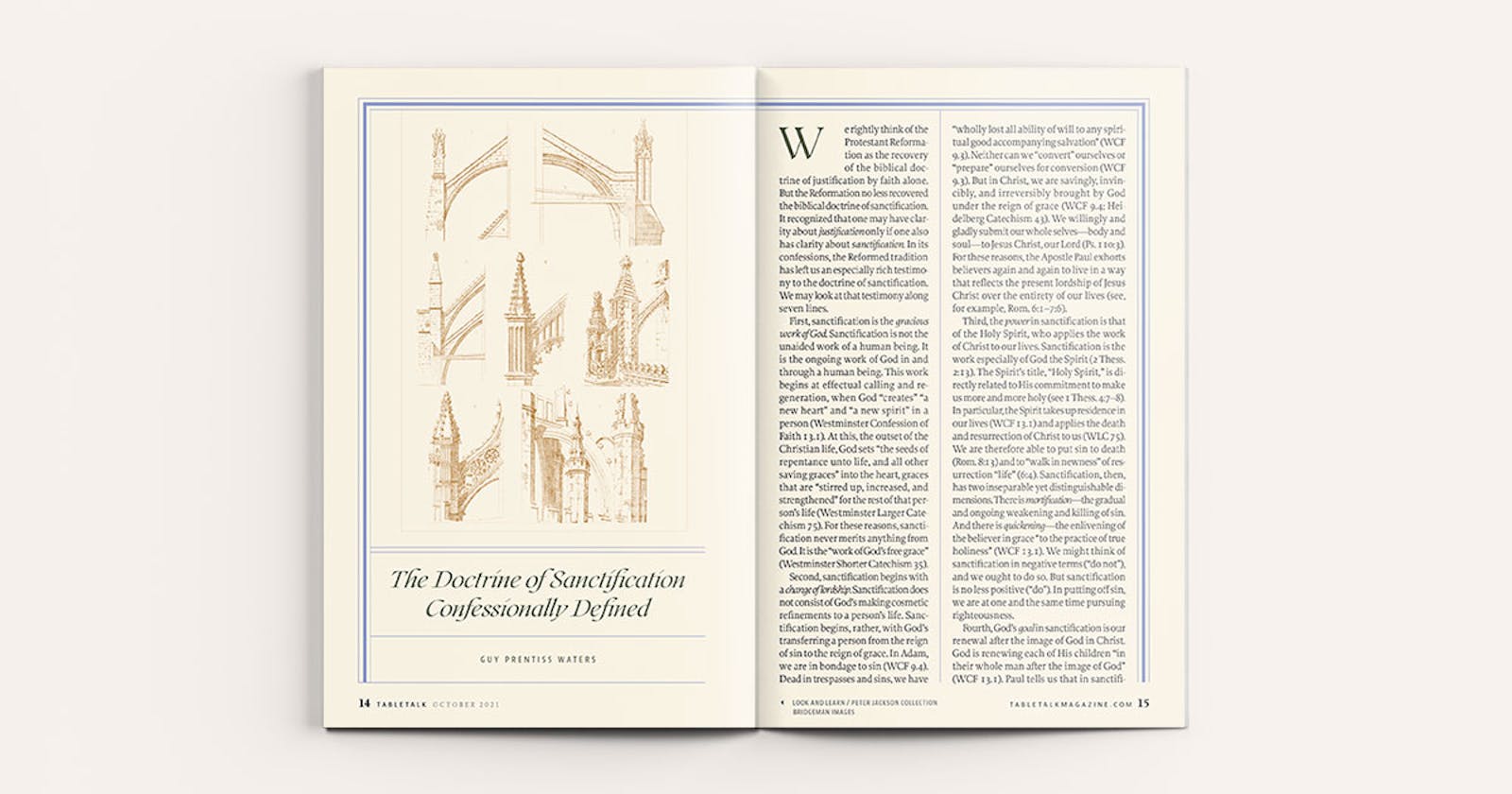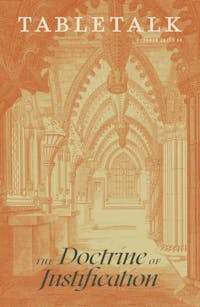
Request your free, three-month trial to Tabletalk magazine. You’ll receive the print issue monthly and gain immediate digital access to decades of archives. This trial is risk-free. No credit card required.
Try Tabletalk NowAlready receive Tabletalk magazine every month?
Verify your email address to gain unlimited access.
We rightly think of the Protestant Reformation as the recovery of the biblical doctrine of justification by faith alone. But the Reformation no less recovered the biblical doctrine of sanctification. It recognized that one may have clarity about justification only if one also has clarity about sanctification. In its confessions, the Reformed tradition has left us an especially rich testimony to the doctrine of sanctification. We may look at that testimony along seven lines.
First, sanctification is the gracious work of God. Sanctification is not the unaided work of a human being. It is the ongoing work of God in and through a human being. This work begins at effectual calling and regeneration, when God “creates” “a new heart” and “a new spirit” in a person (Westminster Confession of Faith 13.1). At this, the outset of the Christian life, God sets “the seeds of repentance unto life, and all other saving graces” into the heart, graces that are “stirred up, increased, and strengthened” for the rest of that person’s life (Westminster Larger Catechism 75). For these reasons, sanctification never merits anything from God. It is the “work of God’s free grace” (Westminster Shorter Catechism 35).
Second, sanctification begins with a change of lordship. Sanctification does not consist of God’s making cosmetic refinements to a person’s life. Sanctification begins, rather, with God’s transferring a person from the reign of sin to the reign of grace. In Adam, we are in bondage to sin (WCF 9.4). Dead in trespasses and sins, we have “wholly lost all ability of will to any spiritual good accompanying salvation” (WCF 9.3). Neither can we “convert” ourselves or “prepare” ourselves for conversion (WCF 9.3). But in Christ, we are savingly, invincibly, and irreversibly brought by God under the reign of grace (WCF 9.4; Heidelberg Catechism 43). We willingly and gladly submit our whole selves—body and soul—to Jesus Christ, our Lord (Ps. 110:3). For these reasons, the Apostle Paul exhorts believers again and again to live in a way that reflects the present lordship of Jesus Christ over the entirety of our lives (see, for example, Rom. 6:1–7:6).
Third, the power in sanctification is that of the Holy Spirit, who applies the work of Christ to our lives. Sanctification is the work especially of God the Spirit (2 Thess. 2:13). The Spirit’s title, “Holy Spirit,” is directly related to His commitment to make us more and more holy (see 1 Thess. 4:7–8). In particular, the Spirit takes up residence in our lives (WCF 13.1) and applies the death and resurrection of Christ to us (WLC 75). We are therefore able to put sin to death (Rom. 8:13) and to “walk in newness” of resurrection “life” (6:4). Sanctification, then, has two inseparable yet distinguishable dimensions. There is mortification—the gradual and ongoing weakening and killing of sin. And there is quickening—the enlivening of the believer in grace “to the practice of true holiness” (WCF 13.1). We might think of sanctification in negative terms (“do not”), and we ought to do so. But sanctification is no less positive (“do”). In putting off sin, we are at one and the same time pursuing righteousness.
Fourth, God’s goal in sanctification is our renewal after the image of God in Christ. God is renewing each of His children “in their whole man after the image of God” (WCF 13.1). Paul tells us that in sanctification, we are being renewed “after the image of [our] creator” (Col. 3:10; compare Eph. 4:24). In particular, each child of God is being conformed to the image of our elder brother, Jesus Christ (HC 86). Sanctification, Paul tells the Philippians, is the process of being conformed to Christ (Phil. 3:10). As we “behold the glory of the Lord” in Scripture, we “are being transformed into the same image from one degree of glory to another,” and this by the power of the Holy Spirit (2 Cor. 3:18). Sanctification also reminds us that God is forming a family of redeemed sinners. Every member of the household is being made to bear the likeness of our heavenly Father’s beloved Son. For this reason, Paul tells the Corinthians, “Be imitators of me, as I am of Christ” (1 Cor. 11:1). In becoming more and more Christlike, we help our brothers and sisters see more clearly what it is that God would have them be as well.
Fifth, God has called us to be participants in our sanctification. Here we may appreciate the way that the Reformed tradition has captured the balance of Scripture’s teaching. Sanctification is the work of God’s grace. But that does not mean we are passive in sanctification. On the contrary, the grace of God engages us in energetic activity. As Paul tells the Philippians, “Work out your own salvation with fear and trembling, for it is God who works in you, both to will and to work for his good pleasure” (Phil. 2:12–13). Precisely because God works in us, we may and must work out our salvation. The grace of God trains us to live lives of godliness (see Titus 2:11–12). How, then, do we participate in our sanctification? We may answer that question along two lines. First, both faith and repentance are gifts of God to the sinner (see Acts 5:31; 11:18; Eph. 2:8, Phil. 1:29), and we have the responsibility to exercise these gifts. God doesn’t believe or repent for us. By the grace of God, we believe and we repent. Second, God has appointed certain means by which He is pleased to bring a person to faith (the ministry of the Word) and to increase and strengthen that faith (the ministry of the Word; the administration of the sacraments; prayer) (WCF 14.1). If we neglect these means, we should not expect to grow in sanctification. If we use these means diligently, then we may look to God to give us the growth in grace that we both desire and need.

Sixth, the Bible alerts us to a particular pattern for the believer’s sanctification. Every believer must pursue those good works that the Bible requires of us. These good works are done in obedience to the moral law of God (see WCF 16.1; HC 115). Good works are important for many reasons in the Christian life, not least to serve as “the fruits and evidences of a true and lively faith” and to “strengthen [our] assurance” (WCF 16.2; compare Belgic Confession 24). Our obedience to God is both a duty and a delight. We obey God’s law both because we have to and because we want to. The life of sanctification is also an ongoing struggle against our enemies: the world, the flesh, and the devil (WCF 13.2; see Rom. 7:14–25; Gal. 5:17). This battle will have its share of setbacks and disappointments, but we fight in light of the victory that Christ has already won on our behalf over sin and death (see 1 John 3:9; 4:4; 5:4–5). And because of God’s commitment to finish what He starts, we know that God will complete the project of sanctification that He has begun in our lives (Phil. 1:6; compare Canons of Dort V.13, WCF 13.3).
Seventh, we should ask how justification and sanctification are different from each other. Each grace is the possession of the believer. There is no justified believer who is not also being sanctified. But these graces are distinct from each other in at least four ways (see WLC 77). First, justification is an act of God’s grace, while sanctification is a work of God’s grace (compare WLC 71, 75). That is to say, justification is a one-time, definitive, legal declaration in God’s courtroom in which we are “counted righteous.” God pronounces this verdict the moment a person comes to faith in Christ. Sanctification is an ongoing and progressive work of God in the life of a believer. Second, justification is presently perfect, while sanctification is presently imperfect “but growing up to perfection” (WLC 77). You cannot be more justified than you are presently. But you can and will be more sanctified, and one day you will be perfectly sanctified. Third, justification addresses the guilt of sin, while sanctification addresses the dominion and presence of sin. In justification, God pardons our sins. In sanctification, God once for all rescues us from bondage to sin and, gradually, removes the presence and influence of sin from our thinking, our choices, our priorities, and our behavior. Fourth, in justification, God “imputes the righteousness of Christ”; in sanctification, God by His Spirit “infuses grace, and enables to the exercise thereof” (WLC 77). In justification, the righteousness of Christ is imputed or counted to the believer in God’s courtroom and received through faith alone. This imputed righteousness is the sole basis for our justification. In sanctification, God infuses grace such that we become inwardly more and more righteous in our lives.
The Reformed confessions aim to help Christians understand the Bible’s teaching clearly and fully. Their goal, we have seen, is to help us live to the glory and praise of God. Truth is always according to godliness (Titus 1:1). If we have put our faith in Jesus Christ, then we now stand perfectly and unchangeably justified. In love, gratitude, and obedience to our great triune God, let us aim for nothing less than what we one day shall be—to be conformed to the image of Jesus Christ.
